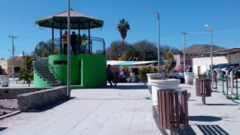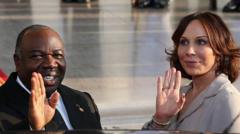Argentina is grappling with a deep sense of loss following the death of Pope Francis, the country's first pontiff. Despite his absence over the years, many remember the warmth he brought to the role and the complicated emotions surrounding his relationship with the nation.
Pope Francis' Death Leaves Argentina in Mourning: A Nation Reflects on Loss

Pope Francis' Death Leaves Argentina in Mourning: A Nation Reflects on Loss
Pope Francis' passing has left profound emotional scars in Argentina, leading to national mourning and reflections on his complicated legacy.
Former Archbishop of Buenos Aires, Jorge Mario Bergoglio, known globally as Pope Francis, left Argentina to attend the conclave for Pope Benedict XVI's successor, unaware that it would mark his last departure from his homeland. Since his papal election, the absence of visitation from the pontiff has fueled a sense of longing in many Argentines. Jorge Ignacio García Cuerva, the current Archbishop of Buenos Aires, poignantly expressed that the faithful feel like "orphans of a father" who held deep affection for his roots, now having to embrace a global fatherhood as Pope.
Many anticipated that Bergoglio’s election would bring unity and pride to the Argentine people. Yet, after a notable twelve-year papacy, feelings have evolved. National mourning has been declared, and while some revere his humble nature, others feel disenchantment due to unfulfilled expectations regarding societal change and political inertia during turbulent times in Argentina.
Guillermo Marcó, a Buenos Aires priest, noted Bergoglio's somber departure for the conclave, as it marked an unexpected turning point. Despite winning hearts globally, many in Argentina had mixed feelings over the years, with a survey by the Pew Research Center indicating a drop in positive perceptions from 91% in 2013 to 64% in 2024.
Critics in Argentina often scrutinized his historical context and the Church's role during the dictatorship years, while reform-focused sectors expressed disappointment. His fluctuating stance on contentious political issues occasionally left citizens polarized, with some believing he had lost touch with his Argentine identity in favor of a broader papal duty.
Despite these challenges, his affection for the nation endured, reportedly reflecting on national affairs, culture, and soccer in personal correspondences with friends and activists. Although he visited neighboring nations during his papacy, Pope Francis never stepped foot in Argentina, continuously citing the need for the right moment to prevent his presence from being politicized.
Current president, Javier Milei, initially harsh in his critique, voiced deep sorrow at Francis’ demise, recognizing his wisdom and compassion. While some Argentines posited that political history created barriers to a visit, others like Gustavo Vera emphasized that the Pope's commitment was to a unified vision for all Argentines, rather than individual factions.
Throughout his papacy, Pope Francis sought to transcend national identity, yet many still regard him as an Argentinian symbol. His devotion to his homeland remained evident, even as he reshaped into a universal leader. The legacy he leaves calls upon Argentines to reflect inward, considering what factors may have prevented a papal return.
As the nation mourns, the complexities of love, disappointment, and identity weave together in the legacy of Pope Francis, leaving a stark reminder of how intertwined faith and national sentiment can be.






















